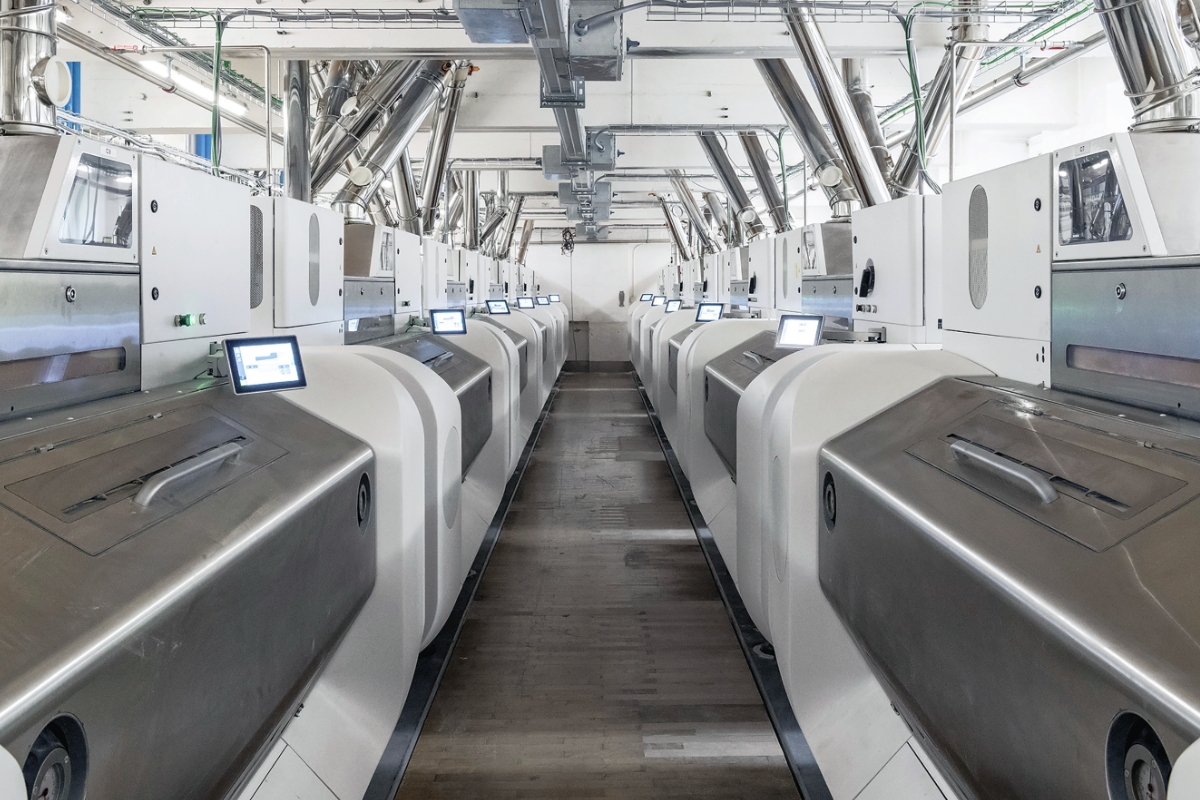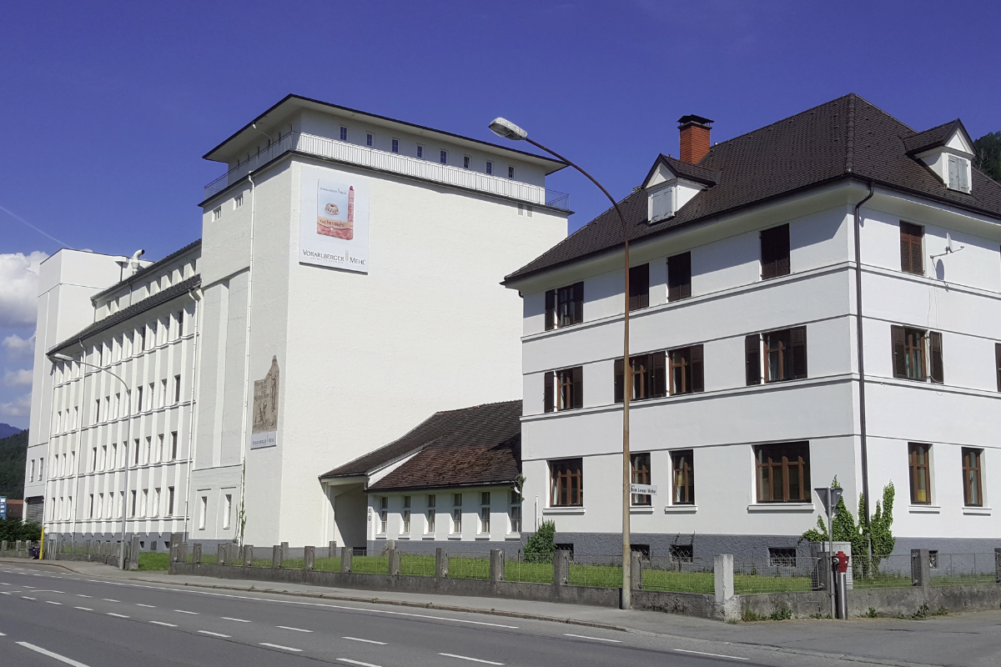Not being located in a harvest region of Austria puts Vorarlberger Mühle & Mischfutterwerke GmbH at a competitive disadvantage, which means the mill must work as efficiently as possible.
While its old Bühler MDDC roller mills in Feldkirch, Austria, were getting the job done, the system was outdated in terms of hygiene, safety and mechanics. As a solution, the company made a rather large move, jumping three main roller mill generations to integrate 0-series Arrius integrated grinding system (IGS) from Bühler, Uzwil, Switzerland, into its production process.
“We are committed to our business and the region, and we needed to make a step forward,” said Heinz Kollmann, head of production and technology. “This is only possible through innovation both in products as well as in technology. With Arrius, we could better guarantee the quality of the end products and achieve efficiency gains through integration with our existing automation. This and our trust in Bühler were why we have decided to go forward with the project.”
It took about a month, from mid-August 2018 to mid-September, for the installation and commissioning of 12 Arrius IGS to be completed. The Arrius machines integrate drive and control cabinets, enabling plug-and-play installation where only spouting and three cables need to be connected.
Vorarlberger Mühle is a five-story swing mill with capacity of 110 tpd of wheat and 90 tpd of durum and 8,500 tonnes of grain storage. While extraction rates, consistent quality, quick recipe swaps and fast product changeover times are extremely important, pure throughput and capacity are not as much. This is due to the fact that the mill produces a very wide range of products, including five different grades of semolina alone.
Small mill, special flours
Vorarlberger Mühle was founded in 1926. Three regional mills were merged into a joint venture in 1992, with eventually just one mill at the current location. From the original three joint venture partners, two private partners remain. In addition to the flour mill, the company has a feed mill in Dornbirn, Austria.
“We are a relatively small mill,” Kollmann said. “This is why our employees are all the more challenged to deliver the best products with which our customers can celebrate perfect cooking and baking successes.”
He said the company mills 20,000 tonnes of wheat, durum and spelt annually. While by Vorarlberger standards that is a lot, by European standards the mill is one of the smaller ones in the region, he said.

A wide variety of user-friendly specialty flours have been developed for more than 30 flours, semolinas and baking mixes. Schnell & Gut is the leading brand in Austria with about 10 different product mixes. Other brands include Vorarlberger Kuchenmehl (cake flour) and Vorarlberger Spätzlemehl (spaetzle flour).
Customers include commercial and industrial bakeries, restaurants and foodservice providers as well as private households (mostly through grocery stores but also some direct sales from the mill). Other customers include large pasta factories in Austria and neighboring countries.
“Of course, this broad product range requires milling skills on the highest level, constant drive for innovation and cutting-edge technology allowing the process flexibility required,” Kollmann said.
The mill’s existing MDDC was a robust machine but it had some drawbacks in terms of hygiene, including wood parts that came in contact with product. Safety concerns included an open/accessible transmission shaft and the mechanical components were at the end of their lifecycles.
Vorarlberger Mühle opted to convert the roller floor to the 0-series Arrius grinding systems. The old roller mills were removed from the building and the floors were reinforced to hold the additional weight. Fourteen MDDC roller mills with roller lengths of 800 and 1,000 mm were replaced with 12 Arrius IGS. Three have a roller length of 1,250 mm and nine have a length of 1,000 mm. Due to the flexibility required in the process all of them are four roller IGS.
The electrical works also were adapted with the use of a power busbar system for the first time. It is a modular approach to electrical wiring where instead of wiring every device individually, they are mounted onto an adapter that is directly fitted to a current carrying busbar.
With that, the number of cables for one Arrius can be reduced to 3 from 13. The time savings for the electrical installation are significant. The reduced mechanical installation due to the integrated drives and control cabinets allowed for the project to be completed ahead of schedule.
At first, the lack of experience with the new machines made it challenging, Kollmann said. The control and setting of the feeding module, which is no longer controlled by bulk density but by level, required collaboration between Bühler and Vorarlberger Mühle.
“All parties did a fantastic job, which paid out in the end,” Kollmann said. “Manual works and changing the machine settings have definitely decreased and we are able to work more efficiently than before.”
Mill process
Vorarlberger Mühle has its own railway connection and can receive grain from lower Austria and Burgenland by rail (about 80%) in an environmentally friendly way. It also can receive grain (about 20%) from the immediate vicinity by truck. The mill unloads up to 80 tonnes of grain per hour with a large railway wagon emptied in less than an hour.
The grain is cleaned and stored in the mill’s own silo, which has a capacity of 8,500 tonnes, until it is ready for grinding. Each silo cell is equipped with several temperature monitoring detectors. This makes it possible to react immediately if the temperature rises by only half a degree Celsius.
Before grinding, the grain is cleaned mechanically and intensively on various machines. This guarantees that the flour is free of foreign bodies and hygienically impeccable.

In addition to the mechanical cleaning machines (magnets, sieves, destoners, etc.), which are standard in most mills, Kollmann said it is the first wheat mill in Austria to install a Sortex color sorter, thus setting new quality standards. The Sortex disposes of infested or immature grains, the poisonous ergot, grain with germ discoloration and grain beetles.
The cleaned food grain is gently ground into quality flours on the milling machines. The machines provide the flexibility required to change recipes quickly and efficiently to produce the company’s multitude of different flours.
The mill can accurately control the starch damage through the pre-stressed roller pack of the Arrius, which ensures a highly stable grinding performance. Safety and maintenance also have improved considerably. The IGS stays closed when it is in operation, but once it is safely opened, access to the feeding module and grinding chamber are unparalleled. Roller changes and regular maintenance works can be executed much faster and more conveniently. A nice bonus of Arrius is reduced noise emission, which has improved the working conditions within the mill.
A majority of the flour is packed in bulk for small and middle-sized bakeries and pasta factories. For restaurants and foodservice operations flour is packed into 10-kg and 25-kg bags. Every hour, 2,500 1-kg packs are filled and automatically placed on euro pallets for retail.
Vorarlberger Mühle has no further expansion plans right now, but with the new grinding system, it would be able to process up to 20% more due to the slightly extended roller length and the optimized grinding performance of the individual machines.
Additionally, continuous improvements will be implemented to work as efficiently as possible and to continue to supply customers at the accustomed quality standard.
With the Arrius integrated grinding system, Kollmann said the mill is ready for the future.
“Our staff likes to work with this new equipment,” he said. “It has enriched the work experience of our millers and will do so in the future. The highly automated Arrius also allows us to maintain the high-quality requirements we and our customers have — even with minimum manpower in the mill.
“This project will definitely secure the existence for the next generations to come. Moreover, we will be ready to increase capacities if the market growth demands it.”






